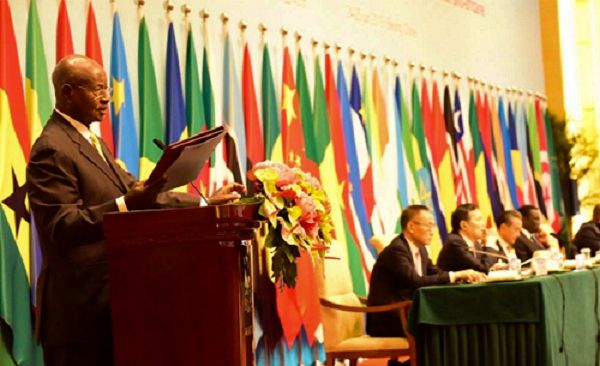
Establish equitable trade models; President Museveni urges Africa, China
The Ugandan President, Mr Yoweri Kaguta Museveni, has stressed the need for Africa and China to establish an equitable trade and development models that will accelerate efforts for growth.
He said Africa and China need to work for win-win frameworks and noted that China, through its support for infrastructure, which is the base of the production of tradable goods and services, was already moving in the right direction.
The two continents, he noted, therefore, needed to emphasise modern wealth and jobs creation, which means understanding the importance of the two primary actors, namely the producer and consumer.
Mr Museveni, who was addressing the Coordinators Meeting on the Implementation of the Follow-up Actions of the Beijing Summit of the China-Africa Cooperation (FOCAC) Meeting in Beijing, China, recently said the producer and the buyer were the life blood of modern business and the more buyers one had, the better for the business.
He said if one produced but one did not get enough buyers, that business would collapse.
“When I buy what you produce, I am supporting your prosperity and vice-versa and high levels of production without high levels of consumption will result in a disequilibrium, like what occurred in 1929 that preceded the Great Depression in the capitalist World.”
Fortunately, he observed that Africa was moving well on this issue of market integration through the East African Community (EAC), the Common Market for Eastern and Southern Africa (COMESA), the Southern African Development Community (SADEC), the Economic Community of West African States (ECOWAS) and, ever since the Abuja Treaty of 1991, the African Common Market and, more recently, the CFTA.
“It was not until the Lagos Plan of Action of July, 1980, that our leaders understood this, 25 years after Sudan’s independence in 1955,” he noted.
He recalled the strategic bottlenecks that were adopted as the shared view points of Africa with some modifications during the 23rd APRM session of June, 2015 in South Africa and noted that the fragmentation of the African market was one of the 10 strategic bottlenecks that were detected over the last 50 years plus of struggle and shared with our African brethren.
The Ugandan President laid stress on the export of raw-materials, which resulted in the loss of money and jobs to the outside world, which causes endless haemorrhage.
Ideological disorientation
He said ideological disorientation was also another bottleneck, where identity (tribe, religion, gender) is taken to be more important than economic prosperity through trade and exchange of goods and services.
The philosophical mistake of not realising the importance of the private sector and, therefore, disrupting it and the under-development of the infrastructure such as the railways, electricity, Information and Communication Technology (ICT) backbone, pipe-borne water and irrigation systems, which led to high costs of doing business, were also part.
Suppressing democracy
There was also the problem of suppressing democracy, which created unaccountable regimes, adding, this problem had been addressed almost everywhere, although there was the need to continue refining the quality.
“The good thing is that many African leaders are now aware of this multi-dimensional challenge to Africa’s growth and transformation, unlike in the past when some of the actors would only emphasise one dimension such as education and forget all the others. When you are aware of a problem, then you cannot fail to solve it,” he stated.
He said President Xi Jinping’s eight points of cooperation, therefore, coincided with some of the bottlenecks, especially underdeveloped infrastructure, with the other bottlenecks including industrial promotion; infrastructure connectivity, trade facilitation; green development; capacity building; health care; people to people exchange and peace and security.
3rd FOCAC Summit
He recalled that in September last year, President Xi, the government and people of China, hosted the 3rd FOCAC Summit bringing together African leaders to deliberate on the way forward on the 3rd FOCAC Cycle running between 2019-2021.
The theme of the meeting was: “China and Africa: Toward an Even Stronger Community with a shared Future through Win-Win Cooperation." We had a very successful Conference which adopted two essential outcome documents including: “Beijing Declaration: Toward an Even stronger China – Africa Community with a shared Future” and the “Beijing Action Plan 2019-2021.”
Relationship
He said the present relationship between China and Africa was not new.
Apart from the ancient links between China and the East African Coast, that relationship was intensified in the anti-colonial period.
After colonialism, even when China itself was still under-developed, they, nevertheless, extended economic solidarity to Africa.
